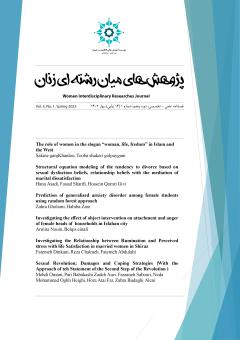Investigating the effect of object intervention on attachment and anger of female heads of households in Isfahan city
Subject Areas :armita nooien 1 * , Belgheis Einali 2
1 - Assistant Professor of Psychology, Department of Psychology and Counseling, Ragheb Esfahani Non-Governmental Higher Education Institute, Isfahan, Iran.
2 - Master of Psychology, Department of Psychology and Counseling, Ragheb Esfahani Non-Governmental Higher Education Institute, Isfahan, Iran.
Keywords: Object interference, Attachment, Anger, Female heads of the household.,
Abstract :
The aim this study was to investigate the effect of object relations intervention on attachment and anger of female heads of households in Isfahan city. This semi-experimental research with a pre-test-post-test design was carried out in the statistical population of female heads of households referring to Isfahan Social Work Clinic in 1401. Among these women, 30 people were randomly selected and placed in two experimental (15 people) and control (15 people) groups. Using Spielberger's (1962) anger questionnaires and Hazen and Shaver's (1987) attachment styles, anger and attachment were evaluated before the start of the intervention sessions and after the end. Data analysis was done using spss20 software and covariance test to analyze hypotheses. The results of data analysis showed that object intervention on anger and its components (angry feeling, tendency to express anger verbally, tendency to physical expression of anger, angry mood, angry reaction, occurrence of external anger, occurrence of internal anger, management external anger and internal anger management) had a significant effect and caused an increase in anger management and a decrease in other components (P<0.05). Also, object intervention has had a significant effect on attachment styles among female heads of households in Isfahan city and has increased secure attachment and decreased ambivalent and avoidant attachment (P<0.05).
1- افروز، غلامعلی؛ کاکابرایی، کیوان؛ صیدی، مریم؛ قنبری، نیک¬زاد؛ و مومنی، خدامرد(1389). رابطه سبکهای دلبستگی با نحوه مدیریت خشم و سلامت عمومی. اندیشه و رفتار در روانشناسی بالینی، 5(18)، 87-95.
2- بختياري، آمنه؛ و محبی، سیده فاطمه(1386). حکومت و زنان سرپرست خانوار. مطالعات راهبردی زنان، 34، 67-110.
3- بشارت، محمدعلی؛ و شالچی، بهزاد(1386). مطالعه نوع رابطه سبکهای دلبستگی ایمن، اجتنابی و دو سوگرا با راهبردهای مقابله با تنیدگی در قالب سه سبک مقابله مسئله محور، هیجان محور مثبت و هیجان محور منفی. روانشناسی تحولی (روانشناسان ایرانی)، 3(11)، 225-235.
4- تخیری، محمودرضا؛ فخری، محمدکاظم؛ و حسن¬زاده، رمضان(1396). نقش واسطهای تنظیم شناختی هیجان در رابطه بین روابط ابژه با تحمل پریشانی هیجانی در دانشجویان دانشکده پرستاری تهران. مجله ایرانی آموزش در علوم پزشکی، 21، 297-307.
5- جهانبخشیان، نیره؛ رسولی، محسن؛ تاجیک اسماعیلی، عزیزاله؛ و صرافی فروشانی، غلامرضا(1398). مقایسه اثربخشی گروهدرمانی مبتنی بر نظریه نظامهای خانواده و زوجدرمانی کوتاهمدت روابط ابژه بر سازگاری زناشویی زنان. مجله علوم پزشکی رازی، 26(11)، 73-86.
6- حسینی، فاطمه؛ وکیلی، پریوش؛ و ابوالمعالی الحسینی، خدیجه(1400). اثربخش زوجدرمانی ﻣﺒﺘﻨﯽ ﺑﺮ ﺭﻭﺍﺑﻂ ﺍﺑژه بر مدیریت خشم زوجهای دارای تعارض زناشویی. فصلنامه خانواده¬درمانی کاربردی، 2(1)، 108-125. doi: 10.22034/aftj.2021.269608.1054
7- خانی، سعید؛ خضری، فرشید؛ و یاری، کتایون(1396). آسیب پذیری اجتماعی زنان سرپرست خانوار و زنان دارای سرپرست در منطقه سلطان آباد شهر تهران. زن در توسعه و سیاست (پژوهش زنان)، 15(4)، 620-597. doi:10.22059/jwdp.2017.233709.1007203
8- دمیرچی، یاسمن؛ و صلاحیان؛ افشین(1397). بررسی رابطه سبکهای دلبستگی، عشق و رضایت جنسی با احساس تنهایی در زنان. فصلنامه علمی مطالعات اجتماعی روانشناختی زنان، 16(1)، 177-198. doi:10.22051/JWSPS.2018.18129.1603
9- رستگار خالد، امیر؛ و عظیمی، هاجر(1393). بررسی تعارض شغلی/ خانوادگی زنان سرپرست خانوار. فصلنامه زن در توسعه و سیاست، 12(3)، 425-448. doi:10.22059/jwdp.2014.53692
10- شکیبا، شیما؛ محمدخانی، پروانه؛ پورشهباز، عباس؛ و مشتاق بیدختی، نهاله(1389). اثربخشی رواندرمانی کوتاهمدت روابط موضوعی بر کاهش شدت افسردگی و مشکلات بین فردی زنان مبتلا به اختلال افسردگی اساسی با همبودی اختلالهای شخصیت خوشه C. روانشناسی بالینی، 2(4)، 29-40. doi:10.22075/JCP.2017.2036
11- علی¬اکبری صبا، روشنک(1396). زنان سرپرست خانوار دارای همسر و مشخصه¬هایی از ازدواج آنها. دوماهنامه تحلیلی پژوهشی، 5(1)، 13-10.
12- قره داغی، علی(1398). مدلسازی معادله ساختاری تعیینگرهای خردمندی بر اساس ادراک از والدگری پدر با نقش میانجی قدرت ایگو در دانشجویان. فرهنگ مشاوره و رواندرمانی، 13(49)، 193- 218. doi:10.22054/qccpc.2021.61579.2723
13- هنرپروران، نازنین(1396). اثربخشی رویکرد تلفیقی ایماگوتراپی و رابه با ابژه بر کنترل عواطف زوجین خیانتکار. روش¬ها و مدل¬های روانشناختی، 8(27)، 15-28. dor:20.1001.1.22285516.1396.8.27.2.7
14- Cozzarelli, C. Karafa, J. A. Collins, N. L., & Tagler, M. J. (2003). Stability and change in adult attachment styles: associations with personal vulnerabilities, life events. and global construals of self and others. Journal of Social and Clinical Psychology, 22(3), 315-346. doi:10.1521/jscp.22.3.315.22888
15- Feeney, B. C. (2004). A secure base: responsive support of goal strivings and exploration in adult intimate relationships. Journal of personality and social psychology, 87(5), 631. doi:10.1037/0022-3514.87.5.631
16- Hazan, C., & Shaver, P. (1987). Romantic love conceptualized as an attachment process. In Interpersonal development (pp. 283-296). Routledge.
17- Mikulincer, M., Hirschberger, G., Nachmias, O., & Gillath, O. (2001). The affective component of the secure base schema: affective priming with representations of attachment security. Journal of personality and social psychology, 81(2), 305.
18- Pollack, D. L., & Keaschuk, R. A. (2007). The object relations of bulimic women in context: An integration of two studies. Eating Disorders, 16(1), 14-29. doi:10.1080/10640260701667920
19- Shahamt Dehsorkh, F., Ghadirian, F., Yekta, Y., Yekta, R., Foroughipour, M., Ghazizadeh Hashemi, F., Esmaeili, M., & Khabazkhoob, M. (2023). Intrapsychic and Interpersonal Realms in Patients with Multiple Sclerosis and Their Comparison with Normal Individuals: A look at Object Relations and Anger Management. Iran J Psychiatry, 18(1), 18-25. doi:10.18502/ijps.v18i1.11409
20- Siegel, J. P. (2020). Digging deeper: An object relations couple therapy update. Family process, 59(1), 10-20. doi:10.1111/famp.12509
21- Smith D. S. (2000). Object Relation and Depression. University of Detroit Mercy Detroit Michigan.
22- Steenbarger, B. N., Smith, H. B., & Budman, S. H. (1996). Integrating science and practice in outcomes assessment: A bolder model for a managed era. Psychotherapy: Theory, Research, Practice, Training, 33(2), 246. doi:10.1037/0033-3204.33.2.246

